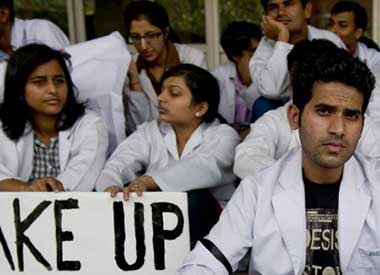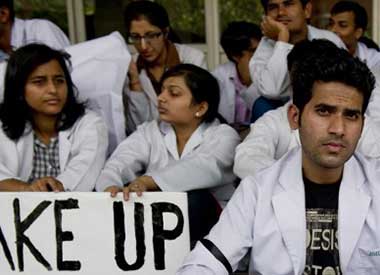In a huge blow to medical students, the Supreme Court on Thursday struck down the common entrance test for admissions to post-graduate and under-graduate medical courses. The decision, in effect, abandons students to the whims and fancies of private medical colleges, many of which have turned the admission process into a moneymaking racket. “In India, money and power speak louder. Students are completely dejected by this verdict. How much more time can we waste? We have lost two years because of the judiciary. We have no hope right now.” says a deeply disappointed Rajesh Routray, an MBBS graduate from Bilashpur, currently doing his junior residency at the All India Institute of Medical Sciences. Ironically, the implementation of a national common entrance test for medical courses was the direct result of a 2011 Supreme Court order (Simran Jain Vs Union of India), directing the Medical Council of India (MCI) to implement its own notification for a common entrance test. A year earlier, in 2010, the government had announced a common entrance examination for entry to all under-graduate and post-graduate medical courses in colleges and institutions recognised by MCI. [caption id=“attachment_970353” align=“alignleft” width=“380”] Image used for representational purposes only. AFP[/caption] But the relief was short-lived. Weeks after nearly a lakh students took the first-ever National Eligibility-Cum-Entrance Test (NEET) in 22 cities late last year, private medical and dental colleges challenged the move in the Supreme Court. In response, the court, in an interim order passed in December, permitted private colleges and states to conduct their medical entrance tests but directed them not to announce the results till further notice (an embargo that was lifted in May) The move by private medical colleges to scuttle a more transparent and merit-based ‘one nation, one test’ system of admission led to a wave of student protests earlier this year in states that were holding separate entrance tests. In January, Delhi students under the banner ‘Save NEET PG, Stop Corruption’ held protests against the ‘tainted admission system’ of private medical colleges. Harassed and frustrated, students spoke of harrowing experiences with managements of private medical colleges which openly sell seats and operate through agents who negotiate deals for seats. During one such protest, Shivani Kapoor, a dental student told Firstpost, “Our demand is that selling of seats should stop. Donations to the tune of Rs 1 crore for a PG medical seat, Rs 50 lakh for PG dental seat — this has to stop.” Kapoor had appeared for the NEET PG 2013 but was in a fix after finding out that private dental colleges in her state, despite being on the list of recognised colleges in the NEET prospectus, were conducting their own entrance tests. [embedalsosee] Recounting her experience, Kapoor had said, “In Uttar Pradesh’s private medical colleges, including the one I graduated from, the seats are paid for. The exam is only on paper, a mere formality. My own college is demanding Rs 36 lakh for a pediatrics seat. For more sought after branches, they charge Rs 50-60 lakh.” Drawing a comparison between the number of seats in government colleges and those in private ones, she had said, “There are only 125 government college seats for PG dental all India. But the number of seats in private dental colleges is upwards of 4000.” A common entrance meant that students could compete for a larger pool of seats. “Currently, about 1.20 lakh students in India compete for 3000-4000 medical seats in government colleges. But when seats in private colleges are also included, as it was under NEET, the number of available seats rose to 11,000," says Routray. NEET also mandated that admissions to all recognised private colleges would be based on the NEET PG merit list. It therefore eliminated the management quota seats which is the source of unlimited cash flow for private medical and dental colleges. “For admissions to private medical colleges, if you have Rs 1 crore, you don’t have to write the entrance. But with NEET even if you have Rs 1 crore, you still have to take the exam because all admissions will be based on the student’s merit position as per NEET results. Also, 50 percent of the seats will have to follow a fee-structure that is reasonable and decided by the government. For the rest of the 50 percent that is allotted the ‘institute pool’, which again is merit based, the private college can decide on the fee," explains Routray. A single entrance test also drastically reduced the money students have to spend writing multiple entrance tests that are held in different states. But in its three-judge 2:1 verdict on Thursday the Supreme Court scrapped the NEET on the grounds that the MCI did not have constitutional authority to prescribe national medical entrance tests and, therefore, that the MCI’s 2010 notification was ultra vires or unconstitutional.
Image used for representational purposes only. AFP[/caption] But the relief was short-lived. Weeks after nearly a lakh students took the first-ever National Eligibility-Cum-Entrance Test (NEET) in 22 cities late last year, private medical and dental colleges challenged the move in the Supreme Court. In response, the court, in an interim order passed in December, permitted private colleges and states to conduct their medical entrance tests but directed them not to announce the results till further notice (an embargo that was lifted in May) The move by private medical colleges to scuttle a more transparent and merit-based ‘one nation, one test’ system of admission led to a wave of student protests earlier this year in states that were holding separate entrance tests. In January, Delhi students under the banner ‘Save NEET PG, Stop Corruption’ held protests against the ‘tainted admission system’ of private medical colleges. Harassed and frustrated, students spoke of harrowing experiences with managements of private medical colleges which openly sell seats and operate through agents who negotiate deals for seats. During one such protest, Shivani Kapoor, a dental student told Firstpost, “Our demand is that selling of seats should stop. Donations to the tune of Rs 1 crore for a PG medical seat, Rs 50 lakh for PG dental seat — this has to stop.” Kapoor had appeared for the NEET PG 2013 but was in a fix after finding out that private dental colleges in her state, despite being on the list of recognised colleges in the NEET prospectus, were conducting their own entrance tests. [embedalsosee] Recounting her experience, Kapoor had said, “In Uttar Pradesh’s private medical colleges, including the one I graduated from, the seats are paid for. The exam is only on paper, a mere formality. My own college is demanding Rs 36 lakh for a pediatrics seat. For more sought after branches, they charge Rs 50-60 lakh.” Drawing a comparison between the number of seats in government colleges and those in private ones, she had said, “There are only 125 government college seats for PG dental all India. But the number of seats in private dental colleges is upwards of 4000.” A common entrance meant that students could compete for a larger pool of seats. “Currently, about 1.20 lakh students in India compete for 3000-4000 medical seats in government colleges. But when seats in private colleges are also included, as it was under NEET, the number of available seats rose to 11,000," says Routray. NEET also mandated that admissions to all recognised private colleges would be based on the NEET PG merit list. It therefore eliminated the management quota seats which is the source of unlimited cash flow for private medical and dental colleges. “For admissions to private medical colleges, if you have Rs 1 crore, you don’t have to write the entrance. But with NEET even if you have Rs 1 crore, you still have to take the exam because all admissions will be based on the student’s merit position as per NEET results. Also, 50 percent of the seats will have to follow a fee-structure that is reasonable and decided by the government. For the rest of the 50 percent that is allotted the ‘institute pool’, which again is merit based, the private college can decide on the fee," explains Routray. A single entrance test also drastically reduced the money students have to spend writing multiple entrance tests that are held in different states. But in its three-judge 2:1 verdict on Thursday the Supreme Court scrapped the NEET on the grounds that the MCI did not have constitutional authority to prescribe national medical entrance tests and, therefore, that the MCI’s 2010 notification was ultra vires or unconstitutional.
SC quashing NEET a victory for corruption, say dejected students
Pallavi Polanki
• July 19, 2013, 17:57:52 IST
The decision, in effect, abandons students to the whims and fancies of private medical colleges, many of which have turned the admission process into a moneymaking racket.
Advertisement
)
End of Article